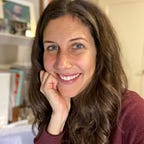Finding Love in the Void of Motherless Mothering
I think I was about ten when I asked my mom a question that resembled a question that I would ask myself 26 years later when I was pregnant with my first child: “When you have a baby and you bring it home, how do you know what to do with it?” My mother’s answer was plain and simple: “Your mother teaches you.”
Tragically, she never got this opportunity; my mother died when I was 24: six years before I would meet my husband, and thirteen years before I would have my first child. I am a motherless mother, and like any other woman in this category will tell you, this fact, this state of being, shapes your identity as a woman and as mother.
Being a motherless mother is undeniably sad; that is obvious. I can actually feel my heart inside my body when I imagine her holding the babies she never got to meet, or even more so, when I think about the possibility of not being around for my own children (a thought I imagine all parents who have lost a parent consider). I have questions about myself as a baby and her as a young mother that I never thought to ask, and therefore, to which I do not have answers. (Topics like breastfeeding weren’t especially relevant when I was in my early twenties.) And while I have many incredible women in my life who have acted as mother figures and wanted to help as much as they could when my babies were born, there was a palpable void.
Being highly aware of this void, and being the incredibly supportive partner that he is, my husband’s Mother’s Day gift to…
